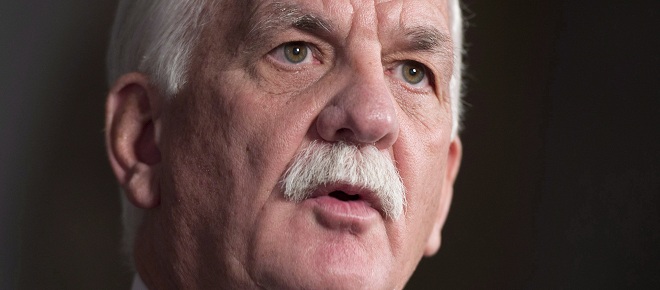Witness protection reform unites MPs
Tease the day: the government and opposition benches tentatively see eye to eye on changes to the protection program
Public Safety Minister Vic Toews speaks about witness protection programs during a news conference in the foyer of the House of Commons on Parliament Hill in Ottawa, Tuesday, Dec. 11, 2012. THE CANADIAN PRESS/Adrian Wyld
Share

Vic Toews, Canada’s public safety minister, to the rescue.
The government and the opposition may not agree about F-35 procurement, foreign investment, union transparency, omnibus budget legislation, diplomacy in the Middle East, alleged voter suppression during the last federal election, fairness for Aboriginal people, or who makes the Speaker of the House look sillier. But there’s at least one thing they can all kind of, maybe agree to support: witness protection.
Toews introduced the Safer Witnesses Act yesterday in the House of Commons. It’s intended to reform the Witness Protection Program that’s faced some controversy in recent years (a protected witness committed murder five years ago, prompting a review of the program). What’s notable was the opposition response after Question Period. “Generally it’s a positive step,” said NDP MP Randall Garrison, the party’s public safety critic, noting a few concerns about funding. Liberal leader Bob Rae said he wanted to hear from experts, but remained optimistic. “I think the fact that we have the legislation in front of us is a good sign,” he told reporters. There you have it, voters. Proof that even at the end of a sitting as acrimonious as this, MPs can still agree about something.
What’s above the fold this morning?
The Globe and Mail leads with Bank of Canada Governor Mark Carney’s warning about the potentially negative effects of the U.S. fiscal cliff on the Canadian economy. The National Post fronts Liberal leadership contender Marc Garneau outflanking the Conservatives on the right. The Toronto Star goes above the fold with the city’s crumbling Gardiner Expressway. The Ottawa Citizen leads with the average annual cost of a federal employee, according to the Parliamentary Budget Officer: $114,100. iPolitics fronts the fiscal cliff’s gradual—not immediate—negative effect on the U.S. economy. CBC.ca leads with an apparently successful North Korean rocket launch. National Newswatch showcases a CBC News story about three F-35 reports out this week that could cause headaches for the governing Conservatives.
Stories that will be (mostly) missed
| 1. Women in the RCMP. Public Safety Minister Vic Toews is demanding the RCMP respond to gender bias on the force, but won’t offer new money to facilitate changes. | 2. Russian justice. An American investor is asking Canada to bar dozens of Russians he thinks committed human rights abuses from gaining admission to the country, if they try. |
| 3. Gender balance. Women outnumber men in Nunavut’s public service by three to one, an imbalance sparked by much higher rates of formal education among women in the north. | 4. Witness protection. The feds plan to broaden the country’s witness protection program and allow national security organizations, not just police, to refer Canadians to the program. |